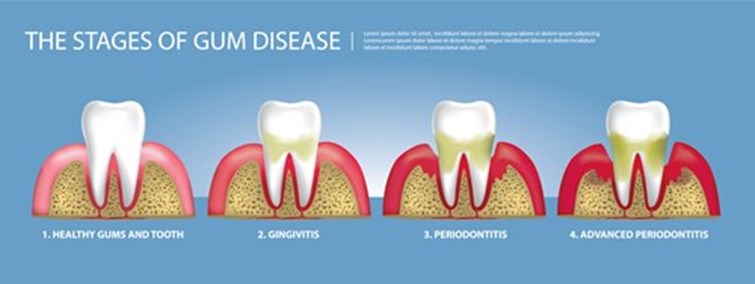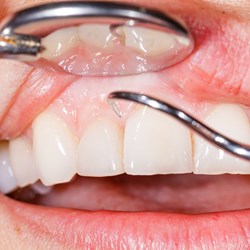Gum Disease
Gum disease is common and most people will get it at least once in their life, when you have diabetes you are at more risk. People with Type 2 diabetes are around three times more likely to develop dental problems than people who don’t have diabetes. Having uncontrolled high blood glucose levels for long periods of time can cause a range of oral health problems including:
- Dry mouth – having a dry mouth slows the movement of bacteria which allows plaque build-up and collection at the gum edges, this can then create more gingivitis (inflammation of the gums).
- Tiredness and low mood – can lead to poor motivation and a lack of motivation to follow a good oral hygiene regime.
- Retina damage and blurred vision – might mean plaque might be harder to see. For more information about eye health see our eye section.
- Slow healing - high glucose can create a breeding ground for bacteria and slow healing meaning excessive bleeding can occur during brushing which can discourage wanting to brush properly.
- Reduced blood flow due to narrowing of arteries - lowers the ability to fight infection and can lead to pain in tissues causing pain when brushing which can discourage brushing
- Increasing risk of gingivitis and fungal infections in the mouth

What can I do to reduce the risk of dental problems?
- Visit an NHS dentist regularly, you can find your nearest one here
- Brush your teeth twice a day
- If you test your blood glucose levels, then ensure you do so regularly to keep within your target range, find out more about blood glucose testing.
- Stop smoking – smoking weakens the immune system making it harder to fight gum infection. Visit YouCanGM.org to find details of stop smoking services and support across all 10 boroughs of Greater Manchester or call the NHS Stop Smoking helpline free on 0300 123 1044.
- Follow a healthy balanced diet, you can find more information here
- Keep dentures clean as a build-up of bacteria can lead to fungal infections.
- Avoid sugary drinks, sweets or mints if you suffer from a dry mouth, try regularly sipping water, sucking ice cubes or sugar-free mints.
To find out more about diabetes and oral health, register for our Understanding Type 1 Diabetes or our My Type 2 Diabetes eLearning courses. There is also a list of additional resources about diabetes and gum disease below. For local services, have a look at the get local section of the website.
Advanced Search
Resource type -
Language -
Type of diabetes -
Keeping your mouth, teeth and gums healthy is an important part of managing your diabetes. Having diabetes means you’re more at risk of dental problems like gum disease, also called periodontal disease. This will help you understand why you’re at risk and how to keep your mouth healthy.


